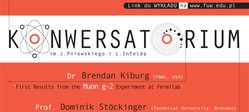
Open lecture
First results from the Muon g-2 experiment at Fermilab, Theory predictions and interpretations of the Fermilab g-2 result
dr Brendana Kiburga (FNAL, USA)
prof. Dominika Stoeckingera (Technical University Dresden, DE)
April 26, 2021, 4:30 p.m.
on-line, via Zoom
The next Jerzy Pniewski and Leopold Infeld Colloquium of the Faculty of Physics will be held today, April the 26th, at 4.30 PM. This time we will listen to two lectures on the hot topic last days, which is the g-2 problem for the muon. It is an interdisciplinary topic, important not only for physicist working in the domain of elementary particles.
The lectures will be:
- First results from the Muon g-2 experiment in Fermilab, dr. Brendan Kiburg (FNAL, USA)
- Theoretical predictions and interpretations of the Fermilab g-2 result, by prof. Dominik Stoeckinger (Technical University Dresden, Germany).
You are welcome to join the meeting 15-30 minutes before the Colloquium to talk or chat in an informal atmosphere.
Zoom: https://us02web.zoom.us/j/93881687598?pwd=UmFhVUdVSXhnQ2tIVVozNmowSUNtZz09
Meeting ID: 938 8168 7598
Passcode: prv316
With best regards,
Barbara Badełek
Jan Chwedeńczuk
Jan Kalinowski
Jan Suffczyński
Dr Brendan Kiburg (Fermilab): First results from the Muon g-2 experiment at Fermilab
The Muon g-2 Experiment recently reported a new measurement of the anomalous magnetic moment of the muon with a precision of 0.46 parts per million. This result is in good agreement with the previous experimental measurement from Brookhaven National Laboratory and has increased the tension with the Standard Model calculation to 4.2 standard deviations, strengthening hints of New Physics. This talk will give a brief description of the experimental history and will provide an overview of the measurement challenges and analysis techniques.
Prof. Dominik Stoeckinger (TU Dresden): Theory predictions and interpretations of the Fermilab
g-2 result.
The quantity g-2 of the muon is sensitive to all known elementary particles and all forces between them. In the Standard Model of particle physics, a highly precise prediction is possible. The observed deviation from the Standard Model might be due to additional, so far unknown particles or forces. The talk will briefly explain the status of the Standard Model prediction and give an overview of potential implications for physics beyond the Standard Model.

